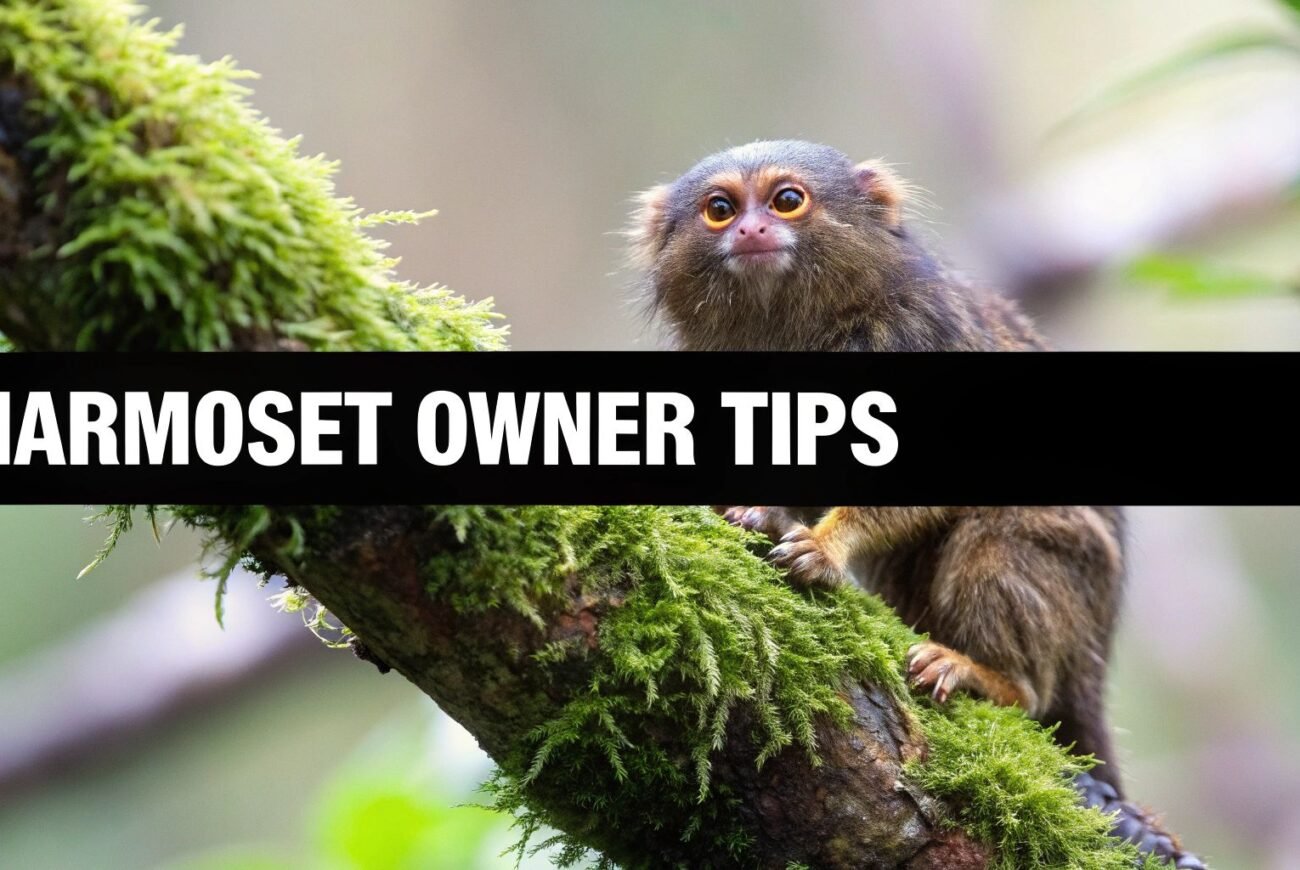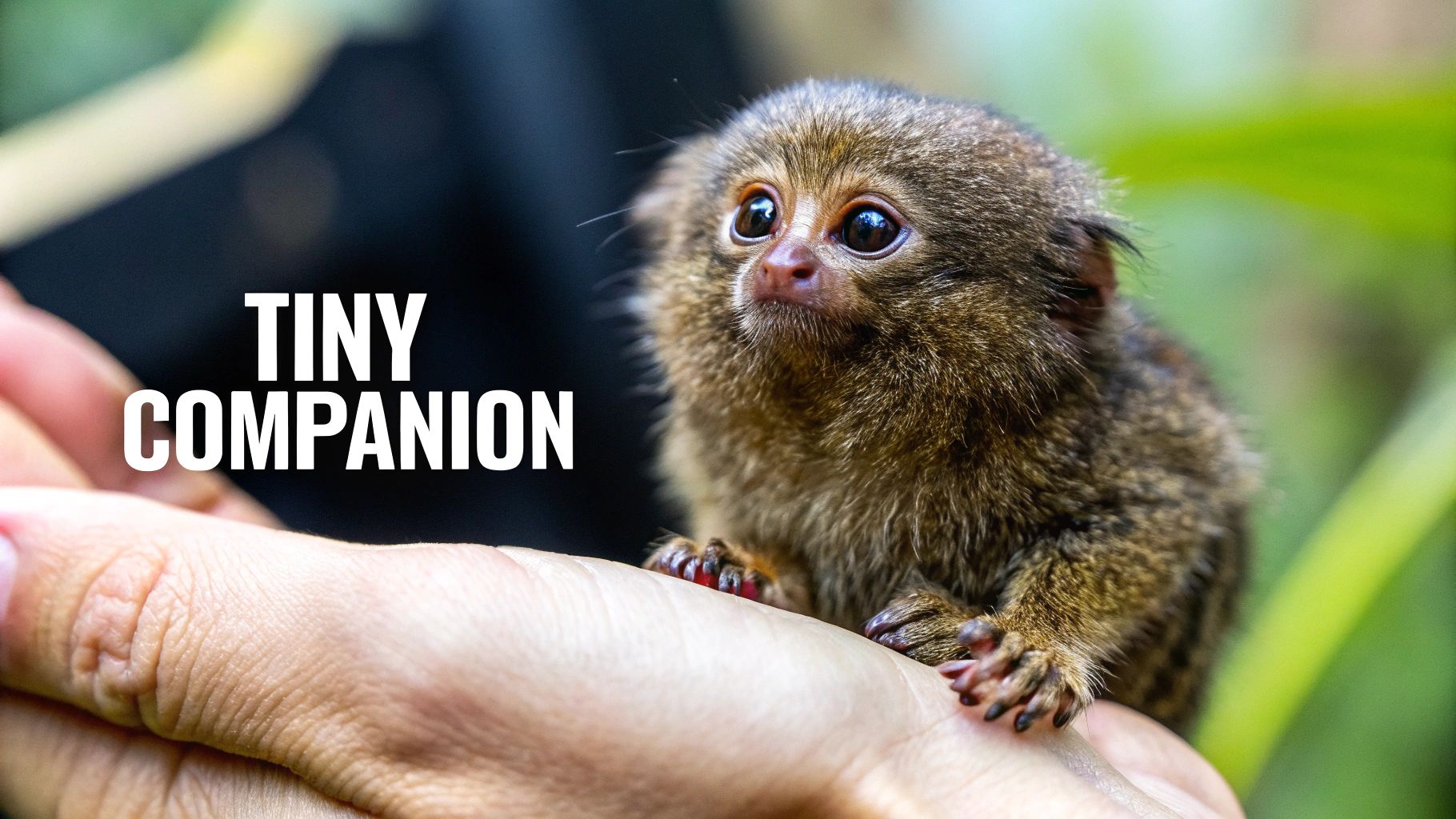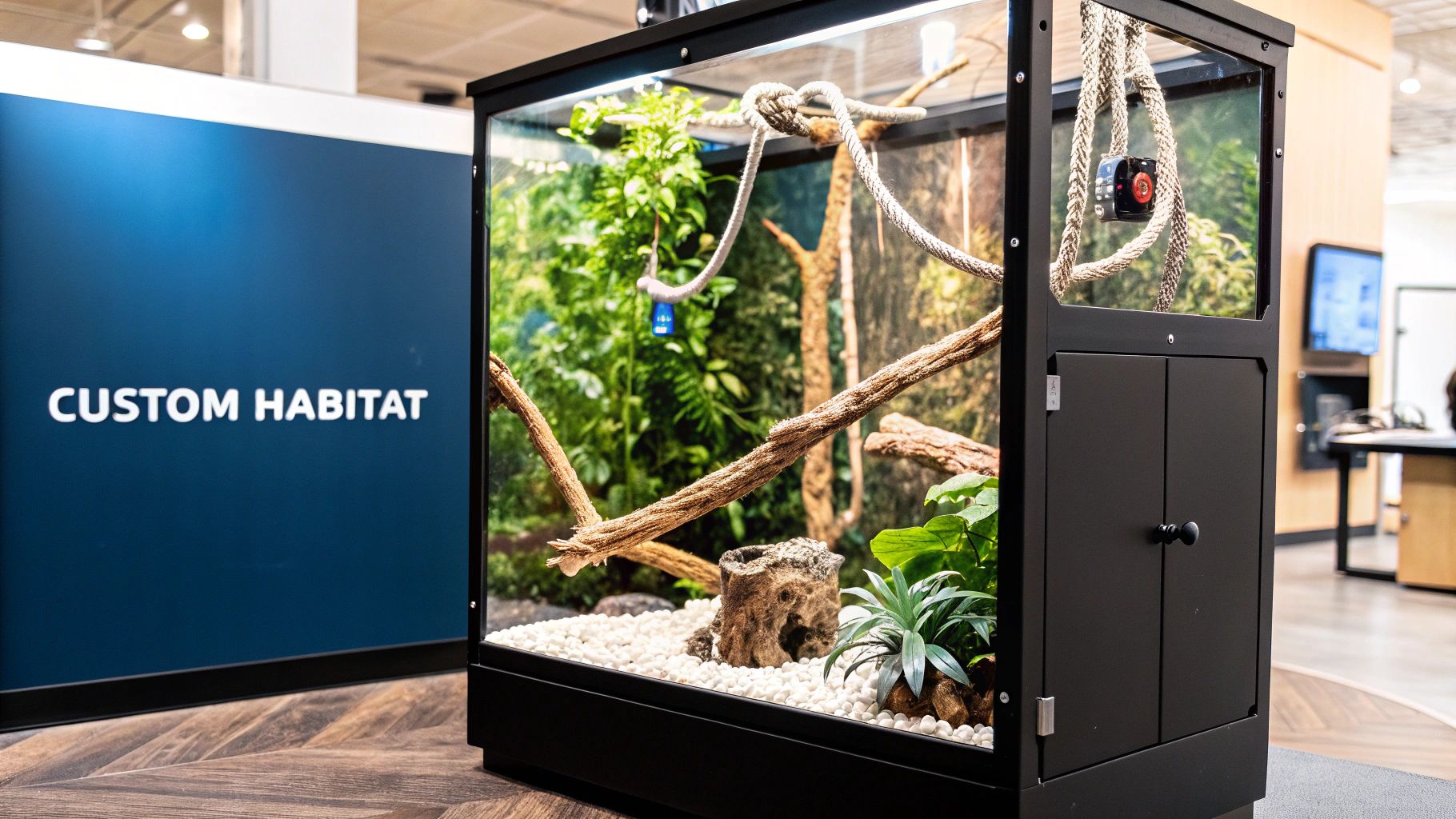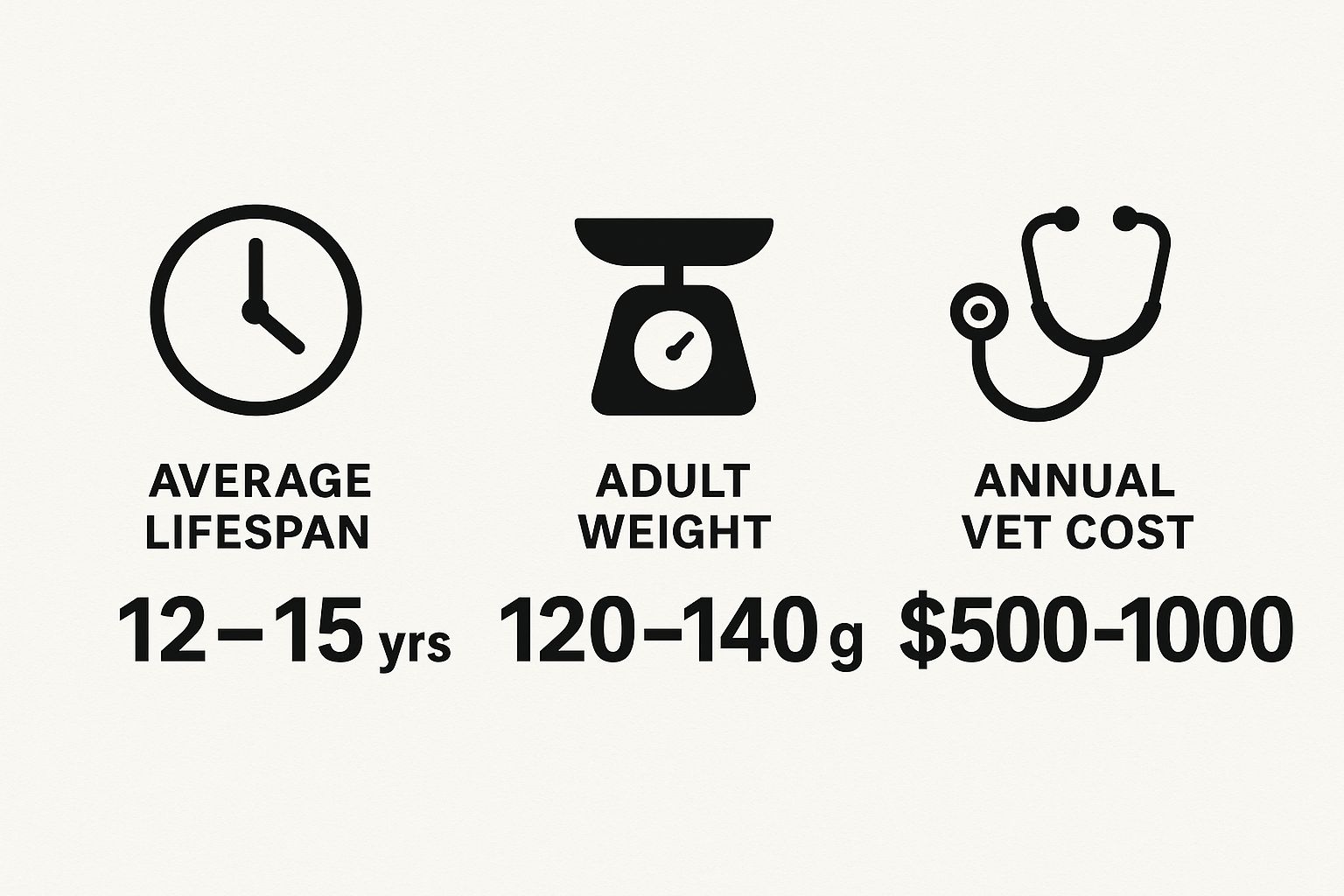
Pygmy Marmoset as a Pet: Essential Tips for Owners
The Tiny Primate Reality: What Few Owners Understand

The pygmy marmoset, the world's smallest monkey, is undeniably captivating. Their miniature size and expressive eyes draw many in. However, this allure often overshadows the complex realities of pygmy marmoset care. These tiny primates are adapted to the intricate ecosystem of the South American rainforest, and their needs extend far beyond a simple cage and fruit.
Natural Behaviors and Social Structures
In their natural habitat, pygmy marmosets flourish within complex social structures. These groups typically consist of 2-9 members and rely on a sophisticated communication system involving vocalizations and scent markings. These groups aren't just random gatherings; they exhibit complex social hierarchies and cooperative behaviors, such as cooperative breeding, where multiple members help raise the young. These social dynamics are essential for their psychological well-being, a critical factor often compromised in captivity.
The Challenges of Replicating the Rainforest
Replicating the rainforest environment for a pygmy marmoset in a domestic setting presents numerous obstacles. Their specialized diet, composed primarily of tree sap, insects, and fruit, is challenging to reproduce accurately. Their need for a large, temperature-controlled enclosure with ample vertical climbing space introduces a significant financial and logistical burden for owners. These specialized care requirements often go unanticipated by potential owners.
Despite their small size and seemingly manageable nature, pygmy marmosets are unsuitable pets for most homes. Recreating their complex natural environment, including a large, specialized enclosure and a diet that mimics their wild feeding habits, is difficult. Learn more about pygmy marmoset care. Furthermore, common household pets like dogs and cats pose a considerable threat. Regulations concerning primate ownership vary, and finding a veterinarian experienced in primate care can be challenging. Organizations like the RSPCA strongly advise against keeping these wild animals as pets.
Responsible pet ownership involves planning for the animal's long-term care, especially considering unforeseen circumstances like the owner's passing. Considering estate planning for families and how such preparations can safeguard an animal's well-being is important. Ultimately, understanding the complex needs of a pygmy marmoset is vital before bringing one home. This benefits both the animal's welfare and the owner's preparedness.
Navigating the Legal Maze of Exotic Primate Ownership
Owning a pygmy marmoset isn't as simple as bringing home a goldfish or a hamster. It's more akin to navigating a complex legal labyrinth. A web of federal, state, and local regulations governs exotic primate ownership, and these laws are becoming increasingly restrictive across the globe. Understanding these regulations is paramount for anyone considering a pygmy marmoset as a pet.
Federal Regulations in the United States
The Lacey Act stands as the primary federal law in the United States regulating exotic animal ownership. This law prohibits interstate trade in wildlife if that wildlife was taken, possessed, transported, or sold in violation of any federal, state, or foreign law. This means even if your state allows pygmy marmosets as pets, buying one from another state that prohibits them could land you in violation of federal law.
State and Local Laws: A Patchwork of Regulations
Beyond federal regulations, each state has its own set of rules, and these can vary wildly. Some states have imposed an outright ban on private primate ownership, while others require permits and adherence to specific housing conditions. Some states might, for example, require a large outdoor enclosure, while others might forbid it altogether. Local ordinances then add yet another layer of complexity, with some cities and counties implementing stricter rules than their respective states. This patchwork of regulations creates a complicated legal landscape. Responsible potential owners must diligently research the specific laws of their location.
Permit Requirements and Legal Responsibilities
In places where pygmy marmoset ownership is legal, it typically involves acquiring the necessary permits. These permits often come with strict requirements, such as providing proof of adequate housing, demonstrating knowledge of primate care, and proving financial stability. Owners also shoulder significant legal responsibilities, such as adhering to specific regulations concerning housing, diet, and veterinary care. Some areas even mandate reporting requirements for escapes or bites. These regulations underscore the substantial legal commitment involved in owning a pygmy marmoset.
The Growing Trend Toward Restrictive Legislation
Growing conservation awareness and an increasing understanding of the intricate needs of primates fuel the rise in restrictions on exotic pet ownership worldwide. As more people recognize the ethical and welfare concerns surrounding keeping primates in captivity, governments are responding by enacting stricter legislation. This means even if pygmy marmoset ownership is legal in your area now, the laws could shift, potentially making future ownership more difficult or even illegal. This trend highlights the importance of thoroughly considering the long-term implications before acquiring a pygmy marmoset. Owning a pygmy marmoset requires respect for the animal’s wild nature and strict adherence to existing regulations. This complexity aims to ensure the animal's well-being and discourage impulsive acquisition. Understanding these regulations is the first step for any prospective owner to make a responsible and informed decision.
The Hidden Costs and Challenges of Marmoset Care
The image of a tiny pygmy marmoset perched on a finger is undeniably cute. But the reality of their care goes far beyond adorable social media snapshots. These miniature primates require an exceptional level of commitment, one that often surpasses the capabilities of even the most well-intentioned owners. Conversations with exotic veterinarians and former marmoset owners reveal the frequently overlooked costs and substantial challenges associated with pygmy marmoset ownership.

The Specialized Diet: A Daily, Costly Endeavor
One of the most significant hurdles is their highly specialized diet. Pygmy marmosets need a complex mixture of specific proteins, fruits, and a substitute for tree sap – their primary food source in the wild. This isn't something you can simply pick up at the local pet store. It requires daily preparation and can easily cost owners thousands of dollars annually. For a deeper dive into this topic, check out our article on How to master the marmoset diet. This dietary complexity adds considerably to both the overall cost and commitment of pygmy marmoset care.
Housing Requirements: More Than Just a Cage
Their housing needs are equally demanding. A simple cage won't do. Pygmy marmosets require a temperature-controlled, predator-proof enclosure with complex climbing structures to replicate their natural arboreal habitat. These specialized enclosures often necessitate home modifications, with initial setup costs ranging from $5,000 to $10,000. This upfront financial investment is a critical factor for potential owners to consider.
Veterinary Care: A Scarcity of Expertise
Finding qualified veterinary care presents another significant challenge. In many areas, veterinarians with expertise in primate care are practically non-existent. This scarcity means that even minor health issues can rapidly escalate into life-threatening emergencies, with limited options for treatment. The lack of accessible emergency care complicates matters further, placing the animal's well-being at considerable risk. It's also vital for potential owners to understand the legalities surrounding exotic pet ownership. Veterans, like all citizens, may need to consult resources such as legal help for veterans.
The Cumulative Burden: Time, Money, and Emotional Toll
Before acquiring a pygmy marmoset, understanding the full scope of their care is crucial. Let's take a closer look at the ideal care scenario versus the typical reality for pet owners:
Pygmy Marmoset Care Requirements vs. Reality
This table compares ideal care conditions for pygmy marmosets with what most pet owners can realistically provide.
| Care Aspect | Ideal Requirement | Typical Pet Owner Reality | Potential Consequences |
|---|---|---|---|
| Diet | Varied, fresh diet including insects, fruits, vegetables, and specialized gum/sap substitutes. Daily preparation and supplementation. | Difficulty sourcing specialized food items. Inconsistent nutritional balance. Reliance on readily available, less suitable options. | Malnutrition, metabolic bone disease, weakened immune system, shortened lifespan. |
| Housing | Large, multi-level enclosure with temperature and humidity control, UVB lighting, and enrichment items mimicking natural habitat. | Smaller, less stimulating enclosures. Inconsistent environmental control. Limited enrichment opportunities. | Stress-related behaviors, decreased activity levels, compromised health, reduced lifespan. |
| Veterinary Care | Regular checkups with an experienced exotic animal veterinarian. Access to emergency care. | Difficulty finding qualified vets with primate experience. Limited access to specialized diagnostics and treatments. Cost-prohibitive care. | Delayed diagnosis and treatment of illnesses. Rapid deterioration of health. Difficult-to-manage medical conditions. |
| Enrichment | Consistent social interaction with other marmosets. Opportunities for foraging, climbing, and exploring. Mental stimulation through puzzles and interactive toys. | Limited social interaction, potentially housed alone. Lack of appropriate enrichment activities. Boredom and stress. | Development of abnormal behaviors such as self-harm, aggression, or depression. Compromised physical and mental health. |
As this table highlights, the gap between ideal care and typical reality can have significant consequences for a marmoset's well-being.
The combined challenges of specialized diet, complex housing, and limited veterinary care create a substantial burden for pygmy marmoset owners. This burden goes beyond finances, requiring significant time commitments for daily food preparation, enclosure maintenance, and careful health monitoring. The constant vigilance and worry associated with potential health crises can also take a considerable emotional toll. The commitment extends far beyond simply providing food and shelter; it demands a deep understanding of their intricate needs and a genuine willingness to dedicate considerable resources to their well-being.
The Ethical Dilemma: Conservation Impact and Animal Welfare

The pygmy marmoset's undeniable charm hides a troubling reality: their popularity as pets fuels a significant ethical concern. Acquiring these tiny primates contributes to a cycle that jeopardizes both the well-being of individual animals and the future of wild populations. The demand generated by the pet trade creates a powerful incentive for capturing pygmy marmosets from their natural rainforest habitat.
This practice has cascading effects, disrupting fragile ecosystems and pushing already vulnerable species closer to the brink.
The Impact on Wild Populations
Pygmy marmosets are currently classified as Vulnerable on the IUCN Red List, primarily due to habitat loss and the pet trade. In countries like Ecuador and Colombia, the impact of the pet trade is particularly pronounced. The capture of these animals has been observed to cause behavioral changes, disrupting their natural social interactions.
In undisturbed groups, approximately 83% of pygmy marmosets live in troops of two to nine individuals, typically led by a dominant male and a breeding female. However, capturing them for the pet trade has led to noticeable shifts in their behavior, such as decreased vocalization and altered social dynamics. While efforts to protect their habitat are ongoing, the pet trade remains a significant obstacle to their population stability. Removing these animals from the wild doesn't just affect individuals; it disrupts intricate family structures and crucial breeding patterns, further endangering wild pygmy marmoset populations.
Psychological Impact of Captivity
These highly intelligent primates also suffer significant psychological distress in captivity. Pygmy marmosets are not domesticated animals. Their complex social structures and innate behaviors are almost impossible to replicate in a domestic setting. Their specialized dietary and environmental needs are rarely met in captivity, contributing to added stress and a variety of health problems.
This can manifest in a number of troubling behaviors:
- Self-harming behaviors: Like excessive grooming or self-biting.
- Abnormal development: Often stemming from insufficient social interaction and a lack of environmental enrichment.
- Shortened lifespans: Compared to their wild counterparts.
Unintentional Support of Wildlife Trafficking
Even those with the best intentions can unwittingly contribute to illegal wildlife trafficking networks. The desire for pygmy marmosets as pets fuels a lucrative black market, incentivizing illegal capture and trade. These animals are often subjected to inhumane conditions during transport and quarantine, resulting in tragically high mortality rates.
Many owners, unprepared for the extensive commitment involved in caring for these primates, eventually abandon them. This leaves abandoned pygmy marmosets with few options for appropriate care and placement.
Bringing a pygmy marmoset home as a pet can have devastating repercussions for both the individual animal and the entire species. Understanding the ethical considerations associated with this practice is essential for making responsible choices that prioritize the welfare of these captivating creatures. Supporting conservation organizations offers a more compassionate and meaningful way to connect with pygmy marmosets without contributing to their decline.
Inside the Exotic Pet Trade: Economics and Reality
Behind the adorable online images of pygmy marmosets, a troubling truth lurks. The economics of this trade paint a stark picture, contrasting the costs of legally obtained marmosets with the often deceptively low prices of illegally trafficked animals. This difference highlights the ethical and conservation issues at the heart of pygmy marmoset ownership.
The Price of Legality vs. Illegality
Legally obtaining a pygmy marmoset is a significant financial commitment, typically ranging from $7,000 to $15,000. This price tag reflects the costs associated with ethical breeding practices, obtaining necessary permits, and ensuring the animal's health is certified. However, the illegal pet trade often offers these tiny primates at a fraction of the cost, tempting unaware buyers into supporting a cruel and unsustainable practice. This appealing price difference hides the suffering these animals endure during capture, transport, and illegal sale.
Social Media's Influence and the Status Symbol Phenomenon
Social media platforms like Instagram and TikTok play a considerable role in fueling the demand for pygmy marmosets. Cute photos and videos portray these primates as ideal companions, bolstering their image as desirable status symbols. This online trend disregards the complex care requirements of these animals and paints an unrealistic picture of what it truly means to own a pygmy marmoset.
Let's take a closer look at some specific statistics about the pygmy marmoset trade. The following table outlines key data and the effect this trade has on the species.
Pygmy Marmoset Trade Statistics
This table presents key statistics about the pygmy marmoset pet trade, including costs, survival rates, and market trends
| Metric | Statistics | Impact on Species | Regional Variations |
|---|---|---|---|
| Legal Purchase Price | $7,000 – $15,000 | Reflects cost of ethical breeding & permits, contrasting sharply with illegal trade prices. | Prices may vary slightly depending on the breeder and location. |
| Illegal Purchase Price | ~$4,500 (e.g., in China) | Significantly lower price encourages illegal trade, driving demand and harming wild populations. | Prices fluctuate based on local demand and enforcement of regulations. |
| Mortality Rate in Captivity | High (exact figures vary) | Captive environments rarely meet complex needs, leading to premature deaths and further fueling demand. | Survival rates may differ depending on the level of care provided, but generally remain low. |
| Trafficking Prevalence | Second-most trafficked primate in some markets (13% of trafficked primates) | Indicates significant pressure on wild populations and the need for stronger enforcement. | Trafficking hotspots vary, but demand in Asia, particularly China, is a major driver. |
These statistics highlight the dire situation facing pygmy marmosets due to the pet trade. The high mortality rate coupled with the lower prices offered through illegal channels creates a vicious cycle that decimates wild populations.
The Harrowing Journey from Capture to Sale
The path a pygmy marmoset takes from the rainforest to someone's home is filled with danger. Capturing these animals often involves tearing apart family groups, causing severe emotional distress to these highly social creatures. The stressful transport and quarantine procedures that follow contribute to alarmingly high mortality rates. The pygmy marmoset's popularity has led to serious concerns about their welfare and conservation. In China, for example, these animals are often sold for approximately $4,500 each. Events like the 'year of the monkey' amplify this demand. Tragically, many of these "thumb monkeys," as they are sometimes called, do not survive long in captivity. The capture process disrupts their natural behaviors and social structures, and pygmy marmosets were the second-most trafficked primate species in some areas, representing 13 percent of all trafficked primates.
The Infographic: A Snapshot of Reality
The infographic below visually represents key data about pygmy marmoset health and care costs. It offers a glimpse into the extensive commitment required for responsible ownership.

The infographic clearly shows that pygmy marmosets live for an average of 12-15 years, weigh a mere 120-140 grams, and require $500-$1,000 in annual veterinary care. These figures emphasize the long-term financial and time investment necessary for proper pygmy marmoset care.
The Aftermath: Abandonment, Euthanasia, and Sanctuary Challenges
Sadly, many pygmy marmoset owners eventually find themselves unable to provide the specialized care these animals need. This leads to a devastating cycle of abandonment, euthanasia, and immense strain on primate sanctuaries. These sanctuaries, often operating with limited resources, struggle to care for the increasing number of marmosets traumatized by the pet trade. This unfortunate outcome underscores the importance of understanding the considerable responsibility involved in owning a pygmy marmoset before acquiring one.
Beyond Ownership: Ethical Ways to Connect With Primates
The allure of pygmy marmosets is undeniable. Their tiny size and expressive faces are captivating. However, bringing one home as a pet presents considerable ethical and practical dilemmas. But don't despair, there are ways to experience the magic of these primates without contributing to their suffering. Numerous ethical alternatives exist, allowing you to appreciate pygmy marmosets while supporting their conservation and well-being.
Virtual Adoption and Conservation Programs
One way to connect with pygmy marmosets is through virtual adoption programs. Several reputable organizations offer these programs, allowing you to symbolically adopt a specific troop or individual living in its natural habitat. You'll receive regular updates on their progress, learning about their daily lives and the challenges they face. Your contribution directly supports research and conservation efforts, ensuring their protection.
Ethical Ecotourism: Observing Primates in the Wild
For a more immersive experience, consider ethical ecotourism. Visiting protected reserves and participating in responsible tours allows you to witness pygmy marmosets thriving in their natural environment. This not only gives you a firsthand glimpse into their fascinating behavior but also supports local communities and conservation projects. This type of experience fosters a deeper appreciation for their wild nature.
Volunteering at Primate Sanctuaries
If you want to take a more hands-on approach, volunteering at an accredited primate sanctuary can be incredibly rewarding. These sanctuaries rescue and rehabilitate marmosets and other primates who have been victims of the pet trade or other forms of exploitation. By donating your time and resources, you'll directly contribute to their welfare, providing essential care and enrichment.
Exploring Companion Animal Alternatives
If it's the companionship of a pet you're seeking, there are many other wonderful and ethical options to consider. A wide variety of domesticated animals thrive in a home environment and can bring immense joy and fulfillment to your life. Choosing a domesticated pet avoids the complex ethical considerations of owning a wild animal like a pygmy marmoset.
Choosing one of these alternatives supports responsible animal welfare practices. It allows you to cultivate a meaningful connection with these remarkable creatures while contributing to a brighter future for their species. Instead of fueling the harmful pet trade, embrace an ethical alternative. It's a win-win for you and the pygmy marmosets.
Making an Informed Decision: The Complete Picture
After exploring the realities of pygmy marmoset ownership, let's consider the key factors every potential owner should ponder. Honestly evaluating legal restrictions, financial obligations, ethical implications, and practical challenges will help you decide if this is the right pet for you. This section prioritizes the animal's well-being above human desires, encouraging thoughtful evaluation of your motivations and ability to meet these primates' extraordinary needs throughout their lifespan.
Legal and Financial Realities
The legality surrounding pygmy marmosets varies significantly. Some regions have outright bans, while others require permits and specific housing stipulations. Navigating these legal complexities can be challenging, and obtaining the necessary permits can be both time-consuming and costly. Even where legal, the financial burden is considerable. Specialized diets, enclosures, and the limited availability of veterinary care can quickly add up to thousands of dollars annually.
Ethical Considerations and Long-Term Commitment
Ethically, pygmy marmoset ownership raises important questions. The Vulnerable conservation status of these animals highlights the detrimental effects of the pet trade on wild populations. Replicating their complex social needs and specialized rainforest habitat in a domestic setting is nearly impossible, potentially leading to psychological distress and shorter lifespans for these tiny primates. Even well-intentioned owners can inadvertently support unethical wildlife trafficking.
These primates require a 10-12 year commitment, demanding consistent and specialized care. Are you prepared for daily food preparation, enclosure maintenance, potential health crises, and the difficulty of finding experienced veterinarians? These responsibilities extend beyond basic pet ownership and require a significant investment of time, resources, and emotional energy.
Considering Alternatives
If your interest in pygmy marmosets stems from a genuine fascination with primates, consider some other ways to connect with these amazing creatures:
- Supporting conservation organizations that protect pygmy marmosets in their natural habitats.
- Participating in ethical ecotourism opportunities to observe these animals in the wild.
- Volunteering at accredited primate sanctuaries that rescue and rehabilitate marmosets from the pet trade.
Choosing these alternatives allows you to appreciate these unique animals without contributing to the ethical and conservation concerns associated with private ownership.
Ready to explore other captivating and ethically sourced companions? Discover a diverse selection at PrimatePet, where responsible ownership and animal welfare are paramount.
Article created using Outrank





Comments
Ronny
August 27, 2025I’m amazed, I have to admit. Seldom do I come across a blog that’s both equally educative and entertaining, and
without a doubt, you’ve hit the nail on the head. The issue is something too few
folks are speaking intelligently about. I am very happy I found this during my search for something concerning this.